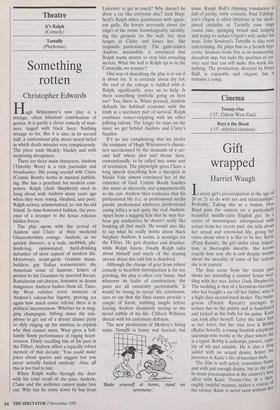Theatre
It's Ralph
(Comedy)
Tartuffe (Playhouse)
Something rotten
Christopher Edwards
Hugh Whitemore's new play is a strange, often hilarious combination of genres. It is partly a clever comedy of man- ners, tinged with black farce. Nothing strange so far. But it is also, in its second half, a confessional play about moral belief in which death intrudes vety conspicuously. The piece ends bleakly, blackly and with surprising abruptness.
There are three main characters. Andrew (Timothy West) is a rich journalist and broadcaster. His young second wife Claire (Connie Booth) works in musical publish- ing. She has a penchant for modern com- posers. Ralph (Jack Shepherd) used to hang about with Andrew many years ago when they were young, idealistic and poor. Ralph arrives, unannounced, to visit his old friend. In time-honoured fashion, the pres- ence of a stranger in the house releases hidden forces.
The play opens with the arrival of Andrew and Claire at their weekend Gloucestershire cottage. Andrew, as we quickly discover, is a rude, snobbish, phi- landering, opinionated, hard-drinking debunker of most aspects of modern life. Motorways, avant-garde German music, builders, gay Italian restaurateurs, the American sense of humour, letters of protest to the Guardian by assorted literati, Rastafarian cab-drivers, feminists in denim dungarees: Andrew bashes them all. Timo- thy West relishes every moment of Andrew's saloon-bar bigotry, proving yet again how much comic release there is in political incorrectness. Whether he is swig- ging champagne, fibbing down the tele- phone to get out of a dreary dinner party or slyly ringing up his mistress to explain why they cannot meet, West gives a bril- liantly funny performance of raging heart- lessness. Dimly recalling bits of his past in the Fifties, Andrew offers a typically robust memoir of that decade: 'You could make jokes about queers and niggers but you never actually fucked anybody'. Alas, all this is too bad to last.
When Ralph walks through the door with his total recall of the past, Andrew, Claire and the audience cannot make him out. Why has he come down by bus from Leicester to get in touch? Why doesn't he drive a car like everyone else? Jack Shep- herd's Ralph mixes gaucheness with appar- ent guile. He hovers nervously about the edges of the room, knowledgeably identify- ing the pictures on the wall, but then lunges at Claire and kisses her. She responds passionately. The guilt-ridden Andrew, meanwhile, is convinced that Ralph wants money to stop him revealing secrets. What the hell is Ralph up to in the Cotswolds, we wonder?
One way of describing the play is to say it is about rot. It is certainly about dry rot; the roof of the cottage is riddled with it. Ralph, significantly, stays on to help. Is there something symbolic going on here too? Yes, there is. When pressed, Andrew defends his habitual economy with the truth as a necessary part of survival. Ralph combines veneer-stripping with his other jobbing talents. The longer he stays on the more we get behind Andrew and Claire's façades.
It's no use complaining that we prefer the company of Hugh Whitemore's charac- ters unredeemed by the demands of a sec- ond half where plot and theme have, conventionally, to be called into some sort of resolution. The playwright gives Claire a long speech describing how a therapist in Maida Vale almost convinced her of the existence of God. Connie Booth handles this scene as discreetly and sympathetically as she can. Andrew then confesses that his professional life (i.e. as professional media pundit, professional adulterer, professional caring leftie) is not quite the real Andrew. Apart from a nagging fear that he may har- bour gay tendencies, he doesn't really like bonking all that much. He would also like to say what he really thinks about black burglars. Andrew, it seems, is nostalgic for the Fifties. He gets drunker and drunker, while Ralph listens. Finally Ralph talks about himself and much of the teasing unease about this odd fish is dissolved.
Although the change of gear from robust comedy to heartfelt introspection is far too grinding, the play is often very funny. And whatever its faults of construction, the parts are all eminently performable. It would be wrong to reveal the conclusion, save to say that the final scenes provide a couple of harsh, stabbing laughs before leaving Andrew drunkenly staring at the moral rubble of his life. Clifford Williams directs with his customary deftness.
The new production of Moliere's biting satire Tartuffe is funny and farcical, but 'Make yourself at home, stand on ceremony.' tame. Ranjit Bolt's rhyming translation is full of pretty, witty conceits. Paul Edding- ton's Orgon is often hilarious in his slack- jawed credulity as Tartuffe runs rings round him, sponging board and lodging and trying to seduce Orgon's wife under his nose. John Sessions's Tartuffe is also very entertaining. He plays him as a Scotch hyp- ocrite. Sessions looks fine as an insinuating, decadent imp, but lacks the qualities of sin- ister zeal that can still make this work dis- turbing. The production, directed by Peter Hall, is enjoyable and elegant, but it remains a romp.


































































 Previous page
Previous page